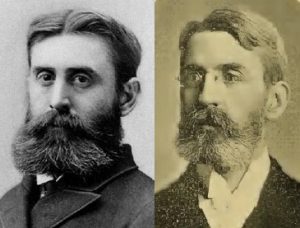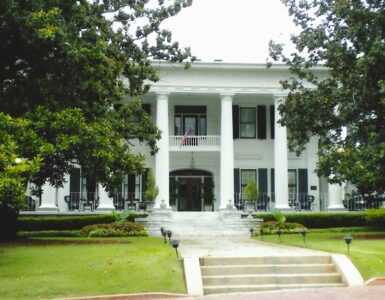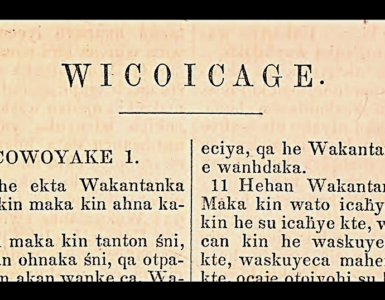 Ethelbert Dudley was born to William and Mary (Cabell) Breckinridge Warfield at Grasmere near Lexington, Kentucky, March 10, 1861. Ethelbert is the name of the sixth-century king of Kent who is said to have been the first English monarch to convert to Christianity and the first to issue a law code—both Christ and the law would prove significant for Ethelbert. He graduated Princeton University, B.A., M.A., Columbia University Law School, LL.B., and studied at Wadham College, Oxford, England. After admission to the Kentucky Bar Association and three years practicing law, he, at the age of just twenty-seven years, became president of Miami University in Ohio. Presbyterian minister and author of the famous eclectic readers, William H. McGuffey, had been a professor at Miami, and George Junkin, also a Presbyterian, was the president, 1841-1844.
Ethelbert Dudley was born to William and Mary (Cabell) Breckinridge Warfield at Grasmere near Lexington, Kentucky, March 10, 1861. Ethelbert is the name of the sixth-century king of Kent who is said to have been the first English monarch to convert to Christianity and the first to issue a law code—both Christ and the law would prove significant for Ethelbert. He graduated Princeton University, B.A., M.A., Columbia University Law School, LL.B., and studied at Wadham College, Oxford, England. After admission to the Kentucky Bar Association and three years practicing law, he, at the age of just twenty-seven years, became president of Miami University in Ohio. Presbyterian minister and author of the famous eclectic readers, William H. McGuffey, had been a professor at Miami, and George Junkin, also a Presbyterian, was the president, 1841-1844.
Warfield and his six faculty colleagues at Miami were from eastern universities which earned them the designation, “Dude Faculty.” They teamed to provide a more stringent curriculum while introducing football to the university with the first game played against the University of Cincinnati ending in a tie. Football was fun, but it was the improved academics that contributed to his short tenure as he and the dudes challenged the status quo.
Ethelbert then became president of Lafayette College in Easton, Pennsylvania, 1891, as well as professor of history and political science until he resigned in 1914. Warfield had a long tenure, but it had not been without tension. Increasingly his commitment to the Westminster Standards and concern for the spiritual welfare of Lafayette’s students came into confrontation with the trustees’ views and goals for progress on campus. Warfield left with little fanfare and two years severance pay. His next position involved a transition from men’s education to women’s when he became president of Wilson College in Chambersburg, Pennsylvania, where he continued until shortly before his death, July 6, 1936.
Ethelbert, and his brother, B. B. Warfield, were important influences in the Presbyterian Church and at Princeton Seminary. Ethelbert had been ordained to the Presbyterian ministry by Lehigh Presbytery in 1899 and was moderator of the Synod of Pennsylvania, 1906. He was a director at Princeton Seminary, 1894-1929, and worked to hold the denomination to its historic commitment to the infallible Scripture as interpreted and summarized by the Westminster Standards. Ethelbert was honored with the D. Litt., by Miami University, LL. D. by Princeton University, and D. D. by Washington and Jefferson College. He was Phi Beta Kappa, as well as a member of the American Philosophical Society, the Sons of the American Revolution, and the American Historical Society. His family included two marriages, the first to Sarah Lacy Broalas,1886, and the second to Eleanor Frances Tilton, 1890, which were blessed with four surviving sons and two daughters (possibly five children). He published numerous articles in serials, some books, and received several positive reviews particularly for The Kentucky Resolutions of 1798: An Historical Study¸ 1887.
The header is compiled from a 1658 edition of the Westminster Confession. In the separated-at-birth portraits the brothers look much alike with Ethelbert on the right. A group portrait of Warfield and his “Dude Faculty” colleagues is available in, Phillip R. Shriver, Miami University: A Personal History, as edited and prefaced by William Pratt, Oxford: Miami University Press, 1998; Ethelbert’s pose with the dudes has his legs crossed in a way similar to B. B. Warfield’s pose when he was photographed in his Hodge House study with George T. Purves.
The following lecture was delivered by Ethelbert Warfield about a year after he became president of Wilson College. Since he spoke to a gathering of Presbyterians commemorating a church anniversary, the brief speech was delivered to a friendly audience—if he had presented it on the campuses of Miami, Lafayette, or Wilson it may have not been so friendly. It is brief with less than 1100 words and is taken from pages 29-32 of History of the Presbyterian Churches of Path Valley: Addresses Delivered at the Sesquicentennial of the Upper and Lower Path Valley Churches and a History of these Churches October 18-20, 1916, edited by D. I. Camp and J. Warren Kaufman, Chambersburg, 1916.
Barry Waugh
PRESBYTERIANISM AND HIGHER EDUCATION
“The Presbyterian Church,” said Dr. Francis L. Patton many years ago, “has not been a cathedral building church. It has been a college planting church.”
It has been zealous not only for education, but for higher education.
Many people think higher education is the same as advanced education, and, therefore, that the medical school, the law school, the school of engineering and the theological seminary are institutions of higher education.
But this is quite incorrect.
By higher education is meant the cultivation of those mental and moral and spiritual elements of man’s nature which constitute his real life, which have to do with the living of a life rather than the earning of a living. Of course they come into play in every part of his active existence, and therefore in his business, occupation or profession. But they contribute to the uprightness of character, the general intelligence, and the kindliness of conduct of the doctor, lawyer or engineer rather than professional skill. To develop these elements of character, so as to make a man a good neighbor and a useful citizen, is no mean part of the great scheme of education, and higher education should do much more than this. It should enable men and women to understand the world in which they now live and that to which the destiny of man surely leads, to love their fellowmen, and with a yet nobler love, to the God who made man to his own image and gave His son for his redemption.
But higher education did not begin with the college and is not confined to it.
The New England folk love to boast of the influence exerted by the schoolmaster’s rod and the little red schoolhouse. And they have just reason for their pride. But not more than the Scotch-Irish have for cherishing the memory of the rule in every pioneer log cabin of the mother’s slipper [a mother’s care?] and the Shorter Catechism. The New England pioneer has enjoyed a just fame, but it was not equal in any respect to the catechism which, though compiled by Englishmen, has been most fruitfully associated with the Scottish people. The grotesque [trite?] strain so characteristically represented by the familiar quotation,
”Zachaeus he, climbed a tree, His Lord to see.”
has no counterpart in the serious grandeur of the catechism which strikes the very highest note of human thought and feeling in the answer to the first question:
“Man’s chief end is to glorify God and enjoy Him forever.”
It was a serious business carried on by the partnership of slipper and catechism, and it was fruitful in many ways.
I recall one young kinsman being detected reading the catechism upside down as it lay in front of him on his mother’s knee. She bragged of him as a very prodigy of a scholar, and indeed he was, for he had laboriously acquired the art of reading upside down to escape the far less difficult task of committing his lessons to memory.
But I also recall the far different case of another kinsman, a general in the regular army, who was asked by another distinguished soldier on the street in Denver, “What is the chief end of man?” And when he received the correct answer said, “I knew by your appearance that you were an army officer and a Presbyterian.” No mean compliment that! Does it not recall that when Peter and John were brought before the council, “They took knowledge of them that they had been with Jesus?”
It was the mothers with the vision who formed the men of love of learning and of God. It was these sons who built the academies and colleges which have trained the leaders of thought and action who have made America a land of liberty and law.
This has been the most striking note in Presbyterianism since it was revived and reorganized by John Calvin and his fellow reformers.
The free Academy of Geneva, founded by Calvin, celebrated not long ago its three hundred and fiftieth birthday. It is the very cornerstone of free public education. From Geneva the ideal won its way down the Rhine, enriched Holland, was carried to England and to New Amsterdam in America. John Knox, who for some time was co-pastor with Calvin, ministering especially to the English and Scotch “exiles for conscience sake,” carried the ideal to Scotland. Knox’s plan for a comprehensive system of popular education, from the elementary school to the university, is the finest ever framed. It was to have been endowed by the State with the wealth of the superseded Roman church, but the greedy nobles seized the spoils of the monasteries and cathedrals and the actual work done for education was small. The impulse, however, was not lost and Scotland’s free schools and universities have had a glorious history and have done much for American education.
My gratitude to Scotland for what I owe to Dr. McCosh, my Princeton President, is very great. How beautiful was his noble face so full of strength and so marked by thought. His sturdy manhood, high philosophical attainments and kindly speech made him a power in the college life of Great Britain and America.
History has a long tale to tell of Presbyterianism and Higher Education. Too long for me to quote from at greater length today. Let me only ask if we are true to the teaching of the precious past? Do we make sacrifices as gladly as our parents did for the education of our children? Do we mark well the difference between manual and mental training, the living of a life and the earning of a living? Do we realize that our girls have as good a right to know the things that make life rich and fruitful as their brothers?
We are living in an age that is not keeping faith with the past. Many of our spiritual treasures are meanly traded away. Our religious birthright is sold for a mess of pottage of pleasure.
Remember those who as elders and ministers have served this church, recall the children they taught and sent at crushing cost to find a higher education at Princeton, Wilson and other colleges, and resolve that, God helping you, the old faith and the old training shall not be given up in this time of automobiles and picture shows for the trifles and trinkets of a shallow life.





